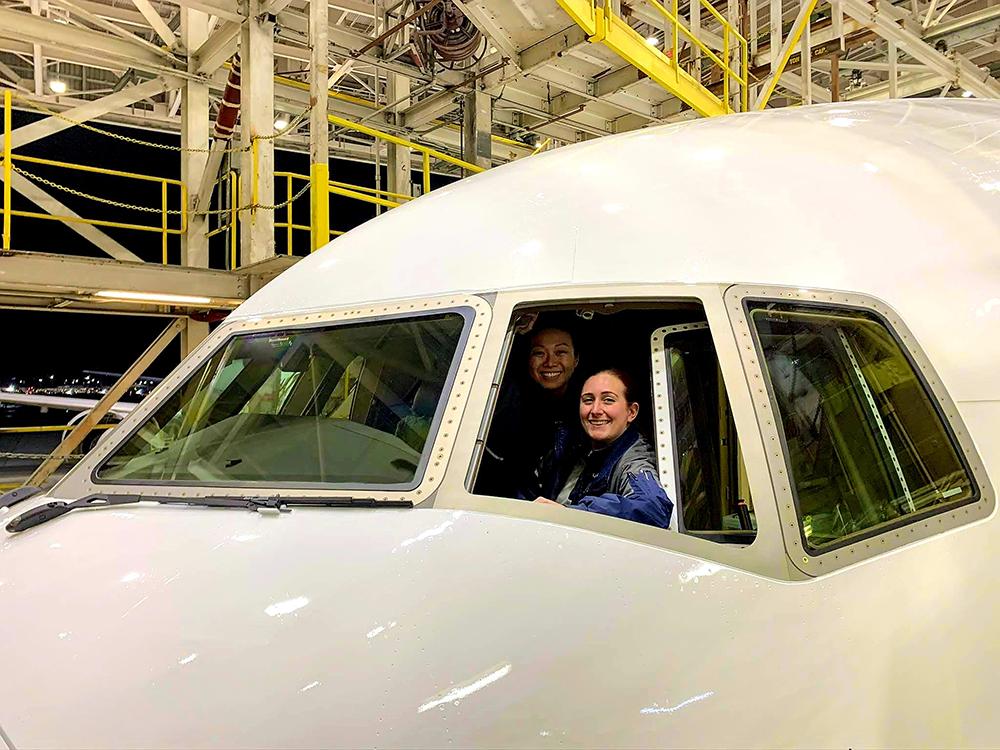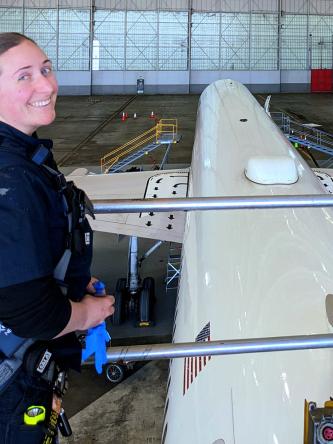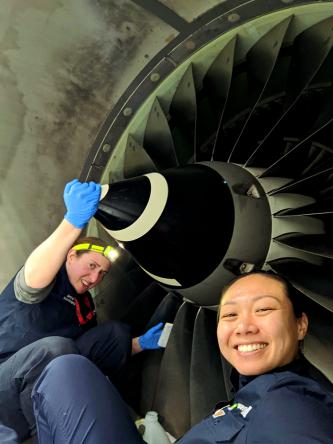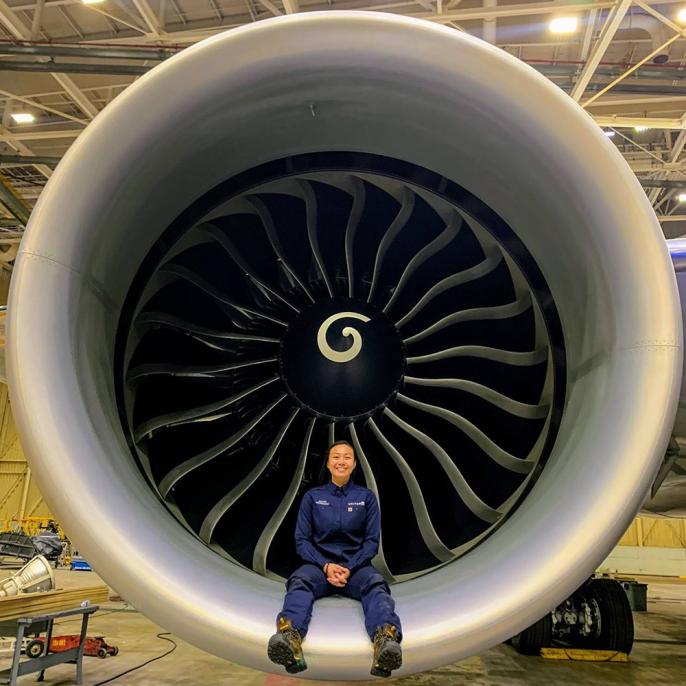Aircraft Maintenance Technicians on How the “MRO Olympics” Shaped Their Careers

The Aerospace Maintenance Competition will be back at MRO Americas this year after a two-year pandemic hiatus. Aviation Week caught up with two past competitors, Yolanda Gong and Katrina Oyer—who are now working as aircraft maintenance technicians with commercial airlines—to find out how the competition helped shape their MRO careers. They also share their advice for young people interested in working within aviation maintenance and related fields.
When did you first compete in the Aerospace Maintenance Competition (AMC) and what was that experience like?
Yolanda Gong: My first time competing in the AMC was in 2018 as a part of the West Los Angeles College team. It was both daunting and exciting to compete against other schools and professionals alike. I didn't expect my hands to start shaking with the anticipation of waiting for Ken MacTiernan [Vice President of the AMC] to say, “Get set, GO," before each event. Of course, we didn't have any experience as aircraft mechanics so we were solely focused on doing our best, learning what we could, and having some fun.
The best part for me was the camaraderie amongst the participants. Aviation is a big industry with a tight community, so any gathering like the AMC brings together great people from various disciplines of aviation whom you will probably run into again throughout your career. I feel very fortunate to be able to meet old friends and make new ones every time I go. And I am so inspired each time I inevitably get to meet some incredible colleagues and hear their stories.
Katrina Oyer: My first time competing in the AMC was in 2016. I was working to get my A&P license while attending Aviation Institute of Maintenance in Houston. I had finished my active-duty service in the Marine Corps and I had no idea what to use my GI Bill for as far as college goes. A friend from the Corps recommended I use it for A&P school, which I had never even heard of, but I decided to try it out and enrolled in AIM Houston.

I excelled in school, despite my limited mechanical knowledge, because I wanted to be the best, no matter what I was doing. An instructor noticed my motivation and asked me to be the captain of our school's Maintenance Skill Team. I remember studying for the competition for several months, but nothing could have prepared me for the feeling I was going to get walking onto the competition floor. It was almost overwhelming to try to very quickly and safely navigate the events before me. I recall telling myself that the most important thing was to have fun, learn everything that I could, and meet some amazing people along the way. Experience will come with time, but enjoying what you're doing is more important in the long run.
Where has your career taken you to since you competed in the AMC?
Gong: At first, I worked on Boeing 737 heavy checks and landing gear changes at a maintenance base for a commercial airline. I've since moved to Denver as a line technician for the same airline and I also spent a year in the cargo airline world as a lead line technician.

As line technicians, our main mission is to ensure a safe and punctual departure, although occasionally we will be called to take a seat apart to help find a passenger's AirPod. If the flight or ground crew writes up an issue our goal is to troubleshoot and fix it or defer it properly until it can be resolved at a more suitable time and place. That time and place is usually in a hangar or when the aircraft is scheduled to remain overnight at a station. Thus, when I work at the hangar I will usually be assigned to research the history, troubleshoot and fix an issue that cannot be addressed out on the line due to time or tooling constraints. And sometimes planes will be routed to our hangars for extended periods to undergo scheduled maintenance.
Some of the projects I have worked on include engine changes, landing gear changes, engine borescopes, bird strike inspections and fuel tank entries. I was recently trained and qualified to perform fuel tank/confined space entries and I am currently working to earn an engine run and taxi qualification. Hopefully I will be able to taxi aircraft and perform high-power engine runs for troubleshooting and operational checks soon.
Oyer: My career really took off as a result of the AMC. I met an amazing recruiter that worked for the airline I wanted to be a part of while I was at the competition. She gave me her contact information and I made it my goal to finish school, take my tests and earn my A&P licenses so that I could work for this company. I currently work for that very same airline in Denver, Colorado and I honestly couldn't be happier. I do both line and hangar aircraft maintenance and I enjoy it so much. I was scared growing up, thinking that I would be stuck at a 9-5 desk job, but now I feel fortunate to have found a path that would lead to me working with my hands and enjoying what I do.
In your perspective, how is an event like the AMC beneficial for students that want to work in the aerospace industry?
Gong: Events like the AMC are a great opportunity to speak to people who are in the aerospace industry and ask them questions. You could be interested in the commercial airlines, cargo companies, MRO companies, the military and other government agencies; the AMC is your ticket to speak to the people who have first-hand knowledge of what piques your interest. Of course, if your heart is set on pursuing a career with a specific company this could also be your chance to network and find their recruitment channels.

I know that getting in touch with our company's recruitment staff at the AMC helped to make my hiring experience seamless. I was able to directly get in touch with the person handling my hiring progress the second I received my A&P license number to begin my interview process without delay. This was important for me because the company I work for uses seniority to determine pay, scheduling and even boarding priority when flying standby. A day of seniority could be the difference between getting to that vacation in Hawai'i or not!
Oyer: Competing in the AMC was absolutely key to achieving my goals and helped lead me to where I am today. As a result of competing, I gained knowledge, skills and, most importantly, the confidence I needed to find my place in this industry. I truly feel that had I declined to compete I may not be where I am now. I am still in touch with that recruiter and every year I work with her by competing and seeking out individuals that want to join the industry.
The AMC showcases everything from general aviation to line maintenance and even the outer space portion of aerospace. It really proves that the sky isn't the limit and highlights the value of the skill of an A&P technician. I describe it as the Olympics of aircraft maintenance.
What would your best piece of advice be for aviation maintenance students that eventually want to work in the industry?
Gong: Stay curious and be kind to your back, knees, etc. Read the paperwork, don't be afraid to ask questions and listen to the answers you receive. There is so much knowledge amongst your colleagues and listening to other perspectives is a great way to broaden your understanding. But you also have to balance that with the ability to respectfully challenge a suggestion that would jeopardize the safety of yourself and others. So, take the time to learn how to use the proper tooling or equipment and be accountable for your work and safety. At the end of the day, the person you should always count on to look out for your well-being is yourself.
Oyer: My best advice for anyone seeking their place in this industry is to stay the course. The schooling is long, and many people endure the hardship of working full time and attending class to earn their license. I have watched so many students make it so far into the program, and even graduate from school, but then not test out for their license. Don't give up on yourself and don't quit, because that hard work should not be wasted! We are experiencing an A&P technician shortage for the first time in decades. Having that license will open so many doors for you, and you deserve to give yourself every option and opportunity to advance and better yourself.





